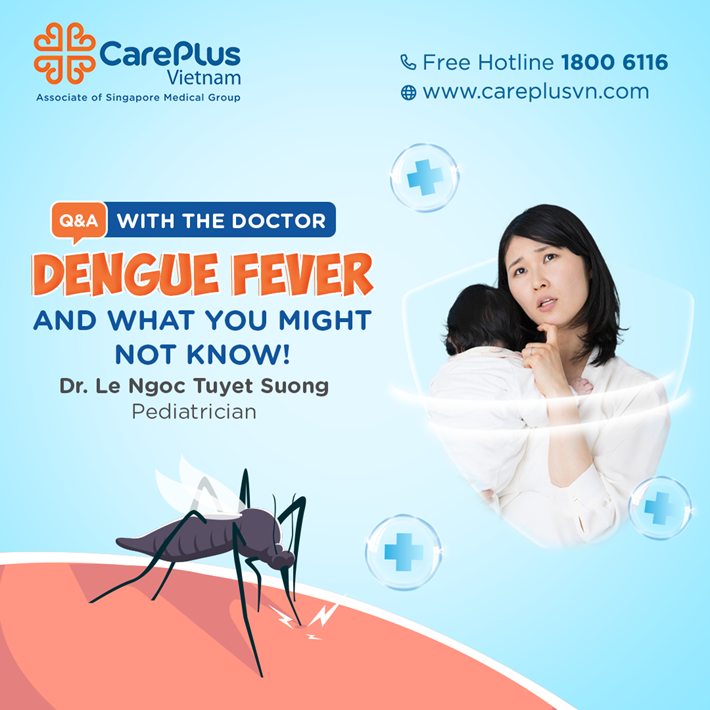Q&A with the Doctor: Dengue Fever and What You Might Not Know!
Although dengue fever is not a new disease, many parents still feel anxious about it, especially now that the rainy season has begun, creating ideal conditions for the Dengue mosquito to spread the disease rapidly.

9/6/2024 1:33:42 PM
To help prevent the disease and provide the best care for patients, let's join Dr. Le Ngoc Tuyet Suong from CarePlus Clinics to answer some common questions parents have about dengue fever!
1. How is dengue fever different in adults and children?
Adults and children have similar symptoms when infected with dengue, but due to different body conditions, the severity can vary.
Dengue tends to be more serious in children than adults, as kids are more prone to going into shock. Parents often underestimate the early symptoms in children, assuming it’s just a fever, which can lead to serious complications before seeking medical attention. Adults, on the other hand, usually go to the hospital at the first sign of fatigue or abnormal symptoms, so severe cases are less common.
Adults often experience platelet drop (bleeding) as a complication, while children typically suffer from fever-related issues, which can lead to organ failure and death if not treated properly.
Another concern is that many parents attempt to treat dengue at home, which can increase the risk of gastrointestinal bleeding if not done correctly.
2. How long is the incubation period for dengue fever?
The incubation period for Dengue Fever is typically 3 to 14 days. Most symptoms appear 4 to 7 days after being bitten by a mosquito.
3. Symptoms of dengue fever include:
- Sudden high fever, potentially up to 40.5°C
- Headache and pain behind the eyes
- Muscle and joint pain
- Loss of appetite, nausea, vomiting
- Sore throat
- Stuffy nose
- Rash, which may itch and appear after the fever starts
- Bruising on the skin
- Bleeding symptoms, such as positive tourniquet test, bleeding under the skin, bruising, nosebleeds, bleeding gums, or blood in vomit, urine, or stool.
Dengue symptoms typically last 2 to 7 days, and most patients recover within a week.
4. When should you go to the hospital immediately?
Warning signs of severe dengue include:
- Fatigue, restlessness, or agitation
- Severe abdominal pain around the upper abdomen or liver area
- Frequent vomiting (≥ 3 times in 1 hour or ≥ 4 times in 6 hours)
- Nose or gum bleeding
- Vomiting blood or blood in urine/stool
- Unusual vaginal bleeding
- Skin bruising or bleeding under the skin
- Difficulty breathing or rapid breathing
5. Does the fever going down mean the illness is over?
Severe dengue symptoms can develop within 24 to 48 hours after the fever subsides. About 1 in 20 patients may experience severe symptoms. You are at higher risk of severe dengue if you have had dengue before. Bleeding in dengue fever is caused by a drop in platelets.
6. Can traditionally remedies like wind scraping or herbal steaming cure dengue? *
Dengue is transmitted through mosquitoes, so herbal steaming does not help cure it. Wind scraping (gua sha) and bloodletting are strictly prohibited for dengue patients. These methods can worsen bleeding under the skin and lower platelet levels, which could lead to life-threatening complications.
7. Can you get dengue again after having it once?
Yes, it’s possible. There are four strains of the dengue virus, and after contracting one, you only build immunity to that specific strain. You can still catch other strains in the future.
8. What should you eat if you have dengue fever?
Do:
- Eat soft, easily digestible foods, with balanced nutrition in small portions.
- Drink plenty of fluids.
Don’t:
- Consume foods or drinks that are red or brown (like blood pudding, chocolate, coffee, watermelon, dark beans) as these can be confused with gastrointestinal bleeding symptoms.
- Avoid greasy, fatty foods.
Remember to:
- Drink lots of water and stay hydrated with ORS or fruit juices.
- Avoid alcohol and carbonated drinks.
- Rest and avoid stress.
- Take fever-reducing medication as prescribed by your doctor.
With dengue cases rising during the rainy season, it's important to recognize the symptoms and seek medical attention promptly. Book an appointment with CarePlus through the Free Hotline 18006116 or message us on the CarePlus Clinic Vietnam Facebook page!